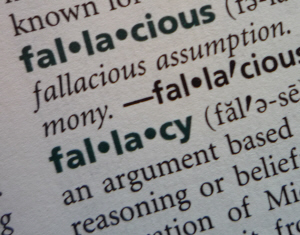
Pseudoproof (Fallacy) |
|
There are encounters in arguments in which a reader will find material that may appear at first to be a proof but really is not a proof at all -- it is a pseudoproof, or what is commonly called a fallacy. Fallacies lead an audience astray, they distort and distract, they represent inadequate reasoning or nonreasoning, and they either exaggerate or oversimplify a claim instead of prooving it. |
| |

Fallacies in Logic
Begging the Question
|
|
No support is provided by the arguer who begs the question, and the claim is simply restated, over and over again, in one form or another. |
| |
Fallacies in Logic
Red Herring
|
|
A red herring provides irrelevant and misleading support that pulls the audience away from the real argument. |
| |
Fallacies in Logic
Non Sequitur
|
|
Non Sequitur in Latin for "it does not follow." In this type of fallacy, the conclusion does not follow from the evidence and the warrant. |
| |
Fallacies in Logic
Straw Man
|
|
A straw man involves attributing an argument to an opponent that the opponent never made and then refuting it in a devastating way. the arguer sets up an idea, refutes it, and appears to win, even though the idea may be unrelated to the issue being discussed. |
| |
Fallacies in Logic
Stacked Evidence
|
|
Stacking evidence to represent only one side of an issue that is clearly has two sides gives a distorted impression of the issue. |
| |
Fallacies in Logic
Manufactured Evidence
|
|
Using fake evidence to prove a claim will discredit an entire argument and ruin the reputation of the individual who makes it up. |
| |
Fallacies in Logic
Unreliable or Insufficient Evidence
|
|
Evidence should be verified, which means you should be able to look it up in another source and find the same information. There should also be enough evidence, and major information that could change the way one interprets the evidence should not be omitted. |
| |
Fallacies in Logic
Exaggerated or Oversimplified Evidence
|
|
Oversimplifying evidence can discredit an argument. |
| |
Fallacies in Logic
Distorted Statistics
|
|
Statistics can be manipulated or changed so that they appear to support a claim when. actually, they do not. |
| |
Fallacies in Logic
Either-Or |
|
Some arguments are oversimplified by the arguer and presented as black-or-white, either-or choices when there are other alternatives. |
| |
Fallacies in Logic
Post Hoc
|
|
This is short for post hoc, ergo propter hoc, a Latin phrase that translates as "after this, therefore because of this." To put it more simply, post hoc is the fallacy of faulty cause. |
| |
Fallacies in Logic
Hasty Generalization
|
|
Sometimes arguers "jump to conclusions" by basing a conclusion on too few examples. |
| |
Fallacies That Affect Character or Ethos
Ad Hominem
|
|
Ad hominem means "to the man" in Latin. An ad hominem argument attacks a person's character rather than a person's ideas or policies.
|
| |
Fallacies That Affect Character or Ethos
Guilt by Association
|
|
The fallacy of guilt by association suggests that people's character can be judged by examining the character of their associates. |
| |
Fallacies That Affect Character or Ethos
Using Authority Instead of Evidence
|
|
This is a variation of begging the question. The arguer relies on personal authority to prove a point rather than on evidence. |
| |
Emotional Fallacies
Bandwagon Appeal
|
|
The argument is that everyone is doing something, so you should too. |
| |
Emotional Fallacies
Slippery Slope
|
|
The slippery-slope fallacy is a scare tactic that suggests that if we allow one thing to happen, we will immediately be sliding down a slippery slope to disaster. |
| |
Emotional Fallacies
Creating False Needs
|
|
Emotional proofs appeal to what people value and think they need. Sometimes an arguer will create a false sense of need where none exists or will unrealistically heighten an existing need. |
| |
Emotional Fallacies
Distorting Emotional Appeal
|
|
Irrelevant and unrelated emotional examples or stories that are unrelated to the subject are sometimes used to try to prove a point. |
| |
|
Ethical arguers |
|
Must have the courage and willingness to argue logically and honestly from a strong sense of personal integrity and values. They should also have a strong sense of responsibility and feel obliged to come forward and advocate for what they believe is right. |
| |
|
Unethical arguers |
|
Often use unethical tactics to influence and fain adherence to their points of view. Such tactics include opinion polls that push for particular points of view, exaggerated or manipulated statistics, manufactured evidence, outright lies, and deliberatly fallicious reasoning, |
| |
